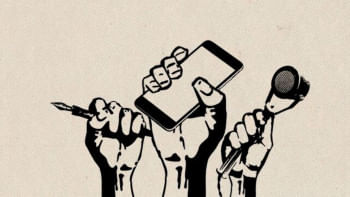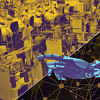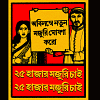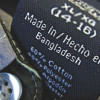The struggle continues

The clock was ticking towards a potential trade deal with the US when, on Thursday afternoon, we gathered at ULAB to discuss the enduring relevance of the recently deceased Kenyan author Ngũgĩ wa Thiong'o. Our session was the concluding panel of the conference themed "La luta literaria continua" ("The literary struggle continues") with a particular focus on Ngũgĩ from a Global South perspective.
I began by reflecting on the possible consequences for Bangladesh's RMG sector if tariff rates remained higher than those of our competitors. Thankfully, by Friday, we received welcome news: the rates had been finalised at 20 percent. The White House's official statement listed Bangladesh among the "trading partners [who] have agreed to, or are on the verge of agreeing to, meaningful trade and security commitments… to align with the United States on economic and national security matters."
While we heave a huge sigh of relief, we are compelled to dig beneath the surface. Ngũgĩ's play, I Will Marry When I Want (1977), provides an opportunity to look for parallels. In the play that got the author imprisoned, Ngũgĩ narrates the tale of a peasant couple, Kĩgũũnda and Wanjikũ, who are promised upward social mobility through marrying their daughter into a rich family. They are led to believe that by mortgaging their only piece of land for a church project, they would earn social prestige and become worthy of their in-laws. Instead, they fall prey to the trap of the wealthy elite and the church and end up losing their land. Ngũgĩ's allegory is not just Kenyan. It is the post-colonial condition that we experience on a daily basis.
To support the RMG business sector, we are already hearing that the national flag carrier will buy 25 Boeing aircrafts worth Tk 50,000 crore. There will be additional purchases of wheat, cotton and other items for a more balanced trade. We want to become an upper-middle-income country, and our paths are stewed with promises. This is a continuing struggle that is mirrored in literature. Our ability to decide on our own is often compromised.
For long, education has been seen as the Jacob's Ladder to climb into an alternative state. But it is education that has reminded us of its entrapment. Man is born free, but everywhere he is in chain, said French philosopher Jean-Jacques Rousseau. Ngũgĩ adds, "Colonialism planted its flags not only on our land but in our minds." Today, when we question whose education it is, we return to Ngũgĩ's first novel, The River Between (1965). The river separates two ridges of Kameno and Makuyu representing the local Gikuyu traditions and Christianity. An idealistic young leader, Waiyaki, tries to bridge the divide through education, but fails only to realise that the colonial wound has cut too deep to heal. Our ambivalent position on the language question allows our education to be the ground zero of discrimination. From the primary level, we are sifting which medium of education will head towards which possible pay scale. The spirit of July that calls to end discrimination must solve this question once and for all.
Revolutionary literature all over the world has shown the frequent bitterness of post-independence betrayal. Petals of Blood (1977) by Ngũgĩ serves as an example. The drought-stricken villagers of Ilmorog sends their elders to Nairobi seeking aid. The relief comes not as salvation but as development projects. Villagers see how money flows in to make them landless. Imagine the people who thrived next to the Padma, and once the bridge was built, although it brought a lot of benefits to the region, how many of those people lost their livelihood depended on the people who came to the river port. The masked progress that hides the teeth of dispossession is common to every country in the Global South, making Ngũgĩ relevant.
In Devil on the Cross (1980), Ngũgĩ unleashed a grotesque vitriol of greed that shows no shame. The shameless admission by the former premier that her attendant had accrued Tk 400 crore offers a local example of Ngũgĩ's devil's feast. The feast of the devil returns when we see that cost of metro rail expansion has skyrocketed.
Last year, when the students extended the calendar to include the days of July in the month of August, they wanted to decentre the fascist mindset. Ngũgĩ's collection of essays, Moving the Centre (1993), teaches us how we can rethink the centre. He shifts the focus from economics to culture. The traditional "centre" of cultural authority, enjoyed by the Global North, needs to be decentred. He relocates the centre to the spaces where most of the world population lives. And to do so, Ngũgĩ argues, we need to stop seeking validation of the Global North, to measure our cultural worth. This is the hardest challenge: are we ready to think of a university as world class if it is not ranked by QS or THE? Are we willing to think of an author powerful without a review in The New York Times or a prize in Stockholm?
To decentre, we need to create an alternative space that celebrates local knowledge, curates indigenous performances and traditions, and intellectually engages with the world on equal terms. This will require our ability to translate both at human and AI-enabled levels so that there is a seamless correspondence with the world.
Remembering the rebel writer Ngũgĩ as part of our celebration of July created an opportunity to examine different layers of oppression, and the liberation that we seek both economically and culturally. We become aware of the tariff relief as a strategic concession that limits our sovereignty. Culturally, we recognise that our fates in the Global South are intertwined. Kenya and Bangladesh are no different in their negotiations with what George Gordon Byron once called "moral North." What is required, then, is to take control of our economic and cultural productions. It requires what Ngũgĩ labels as the decolonisation of the mind. There are three imperatives that can be applied to our context. First, we need to learn to write for ourselves first. Second, we must form a South-South circuit where we learn from one another and pursue mutual growth. Third, we must create our own canon. We need to revisit our pedagogical model to understand what is important for us without the agenda-ridden prescriptions coming from the West.
The literary struggle that we are pursuing today must be guided by a type of decolonisation that refuses to mortgage our future, land or imagination. We need to stop seeking external validation when we set and prioritise our national goals. As for members of the English department, the struggle, la luta literaria, means to keep on telling our own stories without seeking permission. It means creating a creative and critical mass that mirrors our history without propagating someone else's hierarchy.
Dr Shamsad Mortuza is professor of English at Dhaka University.
Views expressed in this article are the author's own.
Follow The Daily Star Opinion on Facebook for the latest opinions, commentaries and analyses by experts and professionals. To contribute your article or letter to The Daily Star Opinion, see our guidelines for submission.

 For all latest news, follow The Daily Star's Google News channel.
For all latest news, follow The Daily Star's Google News channel. 










Comments